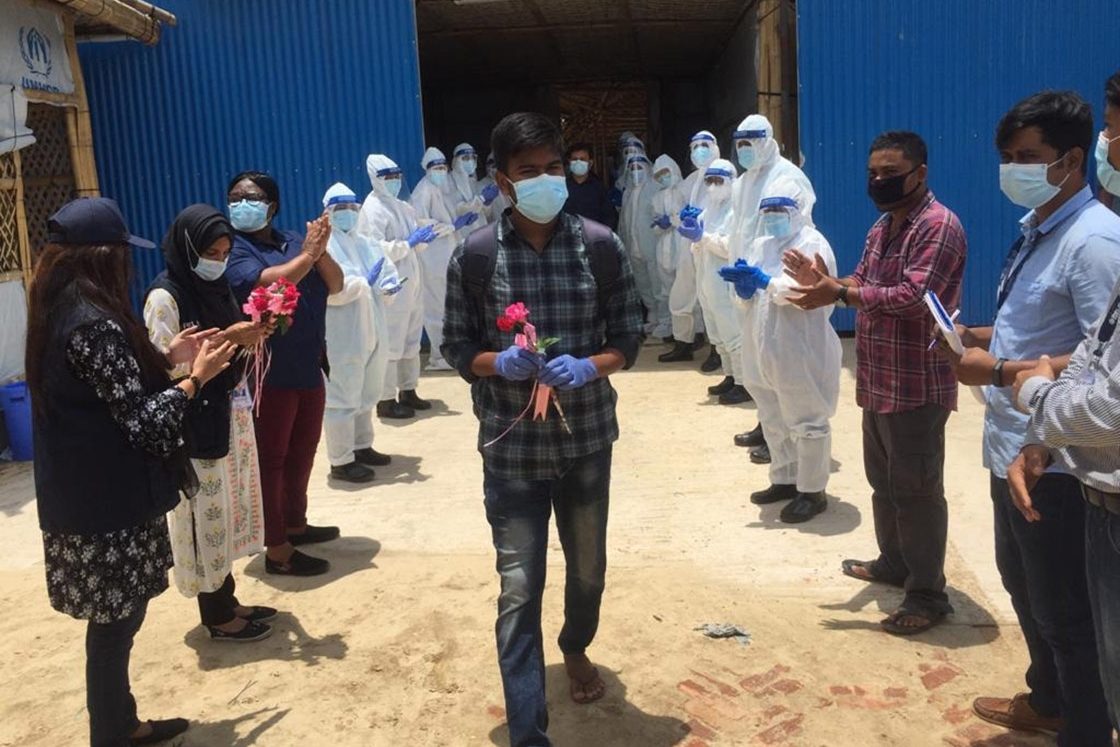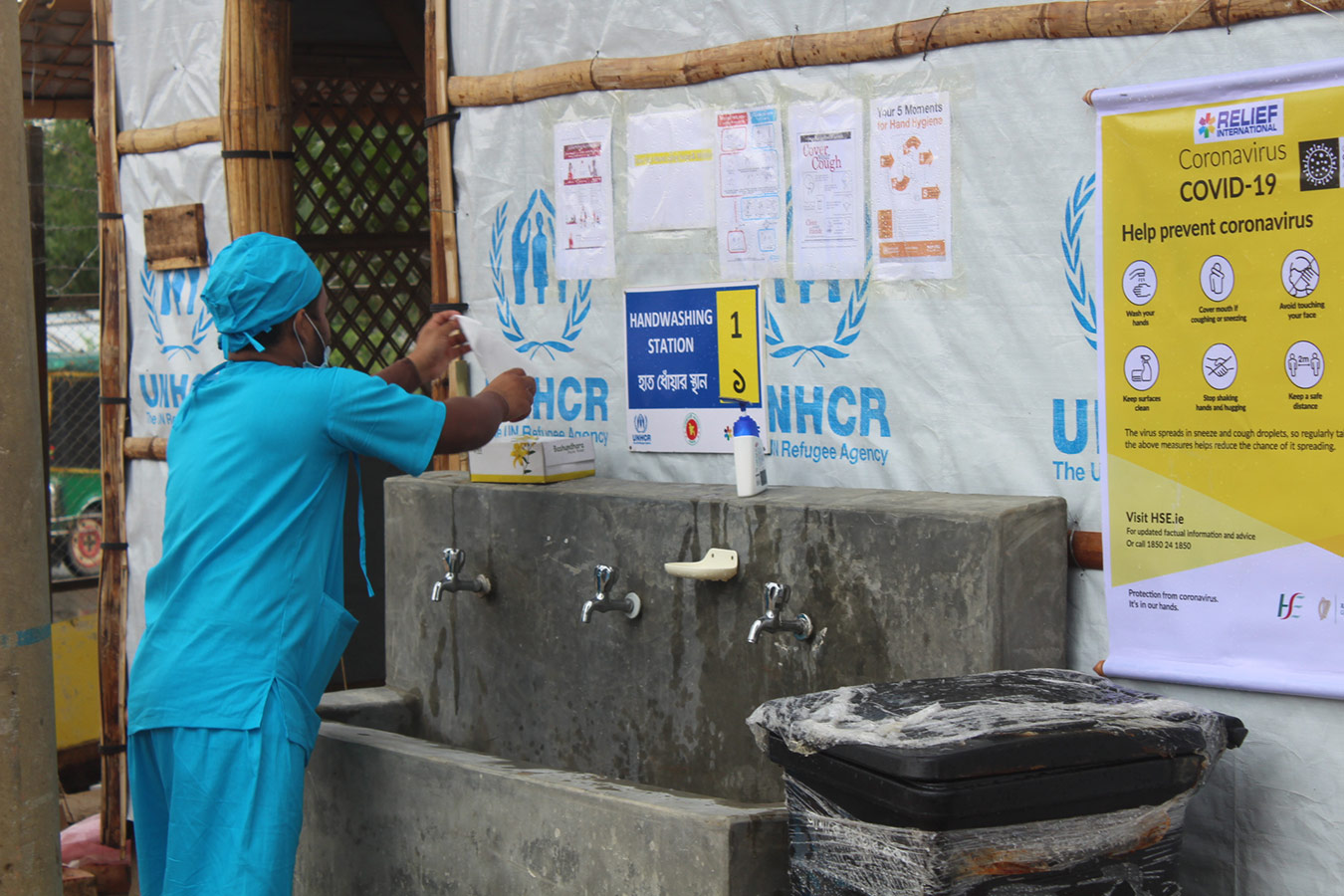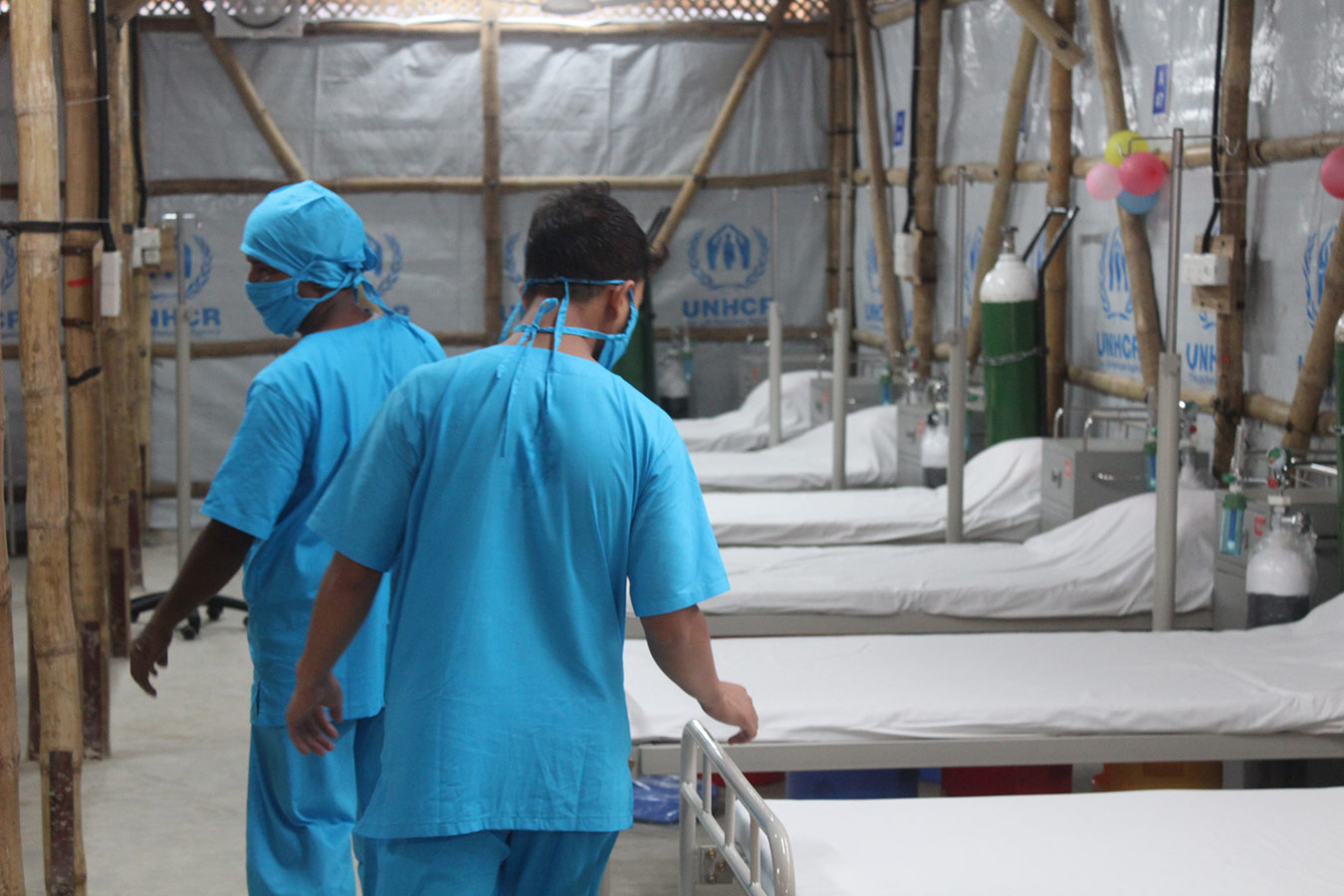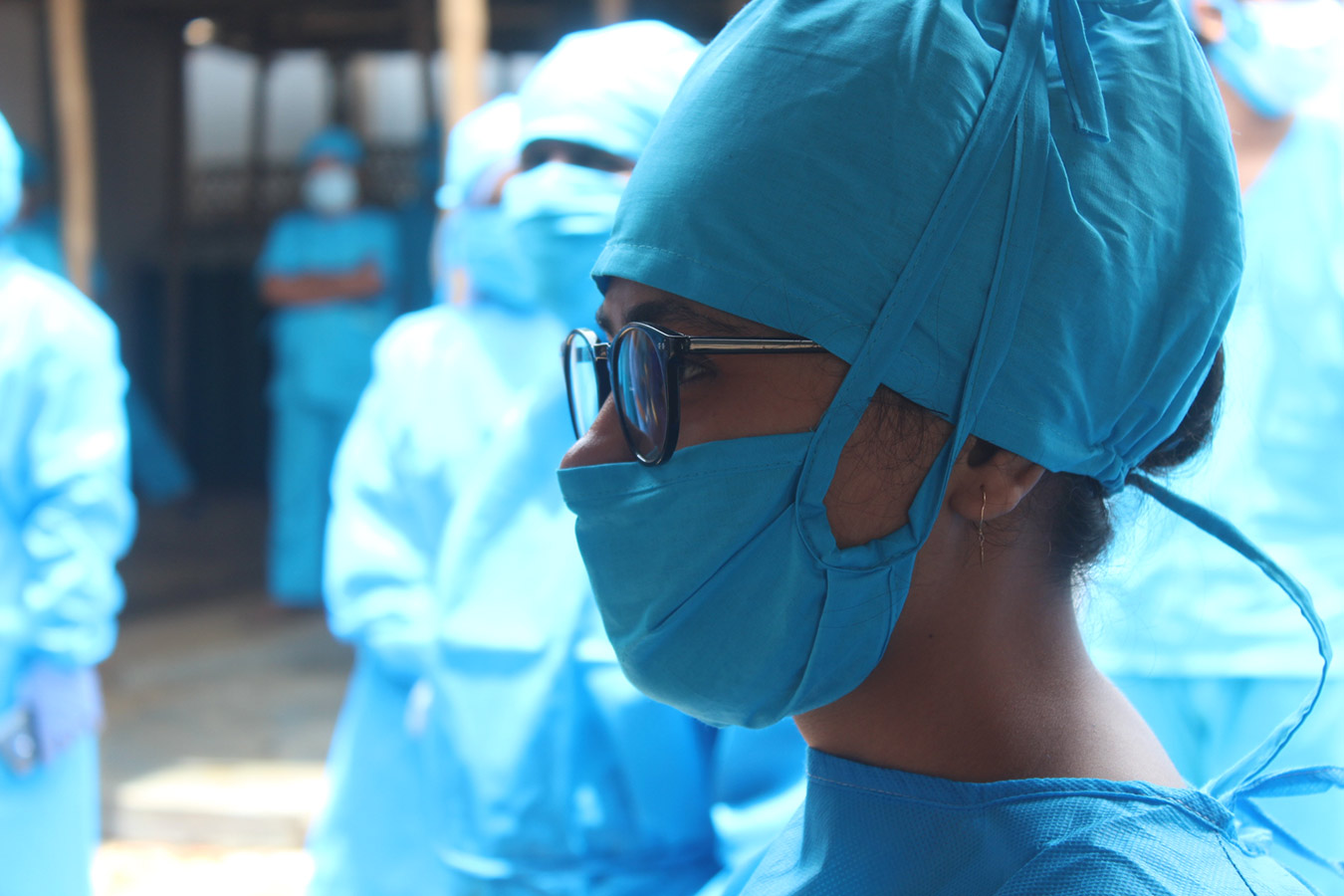Slowly, doctors, nurses, and other staff at the center begin to clap as the first patient, a Bangladeshi man in his mid-twenties wearing a face mask, exits the center. The applause quickly grows louder as the second and third patients emerge in quick succession. This celebration continues until all ten patients have safely left the center, reuniting with their families at home in Cox’s Bazar.
It’s the moment that health workers at Relief International’s isolation and treatment center for COVID-19 have been preparing for months — the day that their hard work and perseverance would result in patients’ full-recovery.
One recovered Bangladeshi patient shares, “I feel really good now. I fought for my life against the coronavirus, and I won. I’m so grateful to be walking out of here with my life, healthier and stronger than before.”
“I’ve found peace after coming here for treatment. This center is truly a saving place,” shares another patient, a woman who lives nearby in Cox’s Bazar.
Relief International discharges first ten patients from COVID-19 center in Cox's Bazar, Bangladesh

On June 14, Relief International health workers celebrate the first ten recovered patients to be discharged from our COVID-19 center in Cox’s Bazar, Bangladesh.
The first case of COVID-19 was confirmed in the sprawling refugee camps in the Cox’s Bazar District of Bangladesh on May 15, home to nearly one million Rohingya refugees. In just a few weeks, there are now more than 2,900 confirmed cases in Cox’s Bazar, including nearly 60 in the Rohingya refugee camps.
In Cox’s Bazar, the Rohingya still live in the same fragile bamboo shelters as when they first arrived after escaping violence against them in August 2017. In this cramped environment, many of the illnesses that Relief International treats at its health facilities are the direct result of their living conditions inside the camps.
The camps have been under a strict lockdown since mid-March to prevent the spread of the virus. “It is a ticking time bomb,” shares Relief International’s Cox’s Bazar Program Director Alejandro Agustin Cuyar. “The refugee camps are intensely overcrowded, with shared water sources, communal toilets, and washing facilities, so preventing viral transmission is near impossible.”
“Once the virus takes hold, it will be incredibly challenging to flatten the curve. We are gravely concerned that the number of people needing treatment will soon be overwhelming.”
It is likely that the coronavirus is spreading more rapidly through the world’s largest refugee settlement than the nearly 60 confirmed cases would suggest. Only a limited number of tests have been carried out in the camps, in part, because many people are simply not going to health facilities to get checked – for fear of being isolated from their families.
Coronavirus preparations in Cox’s Bazar
Since the coronavirus was declared a global pandemic, Relief International’s team on the ground have been preparing for the virus’s eventual arrival in Cox’s Bazar. We began ramping up our response months before the first case of COVID-19 was confirmed in mid-May.
One week after the first confirmed case, we opened our new isolation and treatment facility, just north of the camps. The 144-bed center is the largest of its kind in Cox’s Bazar. It is open to Rohingya refugees and local Bangladeshis who have tested positive for COVID-19, providing potentially life-saving care for members of both communities, free of charge.
“Relief International teams have been working nonstop to mitigate the spread and impact of the outbreak, and help save the lives of Rohingya refugees and local Bangladeshis who contract COVID –19,” shares Alejandro. Our team at the isolation and treatment center have completed numerous dry runs, donning and doffing personal protective equipment prior to the intake of patients.

A health worker undertakes an extensive sanitation protocol before entering Relief International’s isolation and treatment center. The 144-bed center is the largest of its kind in Cox’s Bazar.
© UNHCR/ Louise Donovan
The center is equipped with two ambulances in order to safely transport patients with mild to moderate symptoms safely to the center for treatment. The number of admissions is expected to quickly escalate as the virus spreads throughout the refugee camps, where some 860,000 people live in cramped and unhygienic conditions, and to neighboring host communities.
Since opening on May 26, our teams have already admitted more than 120 patients with confirmed cases of COVID-19. Of these, the first group of recovered patients were released on June 14 after making a full recovery after seeking treatment at our center.
Below, one patient recounts his symptoms, recovery process, and his hopes for the future.
44-year-old Rohan Akter* began experiencing symptoms of the novel coronavirus on the morning of May 22. He woke up with a high fever, sore throat, and persistent cough. The next day, he was transported to the general hospital in Cox’s Bazar where he was tested for COVID-19.
On May 24 around 8 PM, Rohan received his test results via text message. On the screen, the word ‘POSITIVE’ was printed in bold, black lettering. “I felt my heart sink into my stomach the moment that I learned that I had tested positive for the virus,” he shares.
Rohan as quickly transferred to a nearby hospital equipped with dedicated recovery and isolation facilities for patients with COVID-19. He stayed here for more than a week until June 8, but his condition showed no signs of improvement. His relatives, desperate for Rohan to make a full recovery, worked to have him transferred yet again – this time to Relief International’s isolation and treatment center in Cox’s Bazar.
Within an hour, an ambulance dispatched from Relief International’s center waited outside to pick up Rohan, delivering him safely and securely to our isolation ward. Our health teams monitored Rohan’s condition around the clock, providing medication to soothe his symptoms and sharing regular updates on his condition with his worried family members.
“During my recovery, I stayed at so many different facilities – ranging from small testing outposts to large-scale treatment centers. Compared to all other facilities, the treatment I received at Relief International’s center was the difference between heaven and hell,” shares Rohan. “Their nurses, doctors, and health workers treated me with such care.”
Like many patients who have tested positive for COVID-19, Rohan expresses feeling stigmatized by his condition. “At other centers, staff did not talk or interact with us much because they were afraid of contracting the virus.”
Rohan was discharged from the center on June 14 along with nine other patients, all of whom live in Cox’s Bazar. Since then, an additional 72 Bangladeshis and one Rohingya refugee have been released from the center after making full recoveries.
Rohan is now self-isolating at home, but in a room away from the rest of his family. He is getting stronger with every passing day.
“My support system —including my family, friends, doctors, and nurses – made it possible for me to recover. I’ve never felt such joy as I did when I walked out of the center. I have my whole life ahead of me, and for that I am so grateful”

Relief International staff prepare the isolation and treatment center to accept its first patients, all of whom have presented with moderate to severe complications associated with COVID-19.
© UNHCR/ Louise Donovan
“We’ve prepared for the worst, and are hoping for the best”
Relief International’s 144-bed isolation and treatment center in Cox’s Bazar is part of an overall effort by the humanitarian community to provide 1,900 treatment beds, isolation centers, quarantine facilities, and other referral services to treat patients who have tested positive for COVID-19.
In the camps, we have also transitioned two of our health outposts and primary healthcare center, offering immediate treatment for less severe COVID-19 cases, and making referrals to other services when necessary. Our trained community health workers are also going door-to-door to identify new cases of COVID-19, connecting refugees with vital treatment services.
But, this is just a fraction of the capacity necessary to confront a widespread outbreak, especially if transmission rates spike throughout the Rohingya community.
As we have rapidly scaled up our health program in response to the pandemic, we have also undertaken a massive recruitment effort of local Bangladeshi staff. We have added 212 people to our team – including doctors, nurses, pharmacists, cleaners, and security guards – all of whom have undergone rigorous health and safety training.
“Only time will tell how much damage the virus will wreak,” shares Relief International’s Cox’s Bazar Program Director Alejandro Agustin Cuyar. “We’ve prepared for the worst, and are hoping for the best.”
*Name changed to protect identity.
